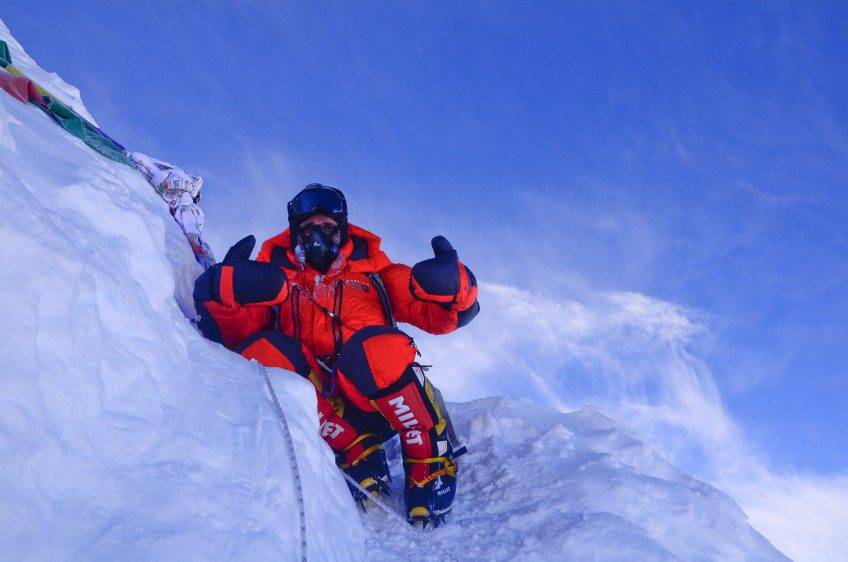Mother Nature denied Mumbai-based MatchCraft software engineer Kuntal Joisher his first try at summiting Mount Everest, the world’s highest peak. Now he’s getting ready for a second attempt – and we’re both awed and excited by his passion. We asked Kuntal to share his Everest story.
MatchCraft: Why is climbing Everest important to you?
Kuntal Joisher: For me, this climb has a higher purpose than my own accomplishments. Summiting Mt. Everest is my passion in life; it is my platform to be a voice for those who have none. Being able to share my personal journey as a caretaker for my father, who suffers from Lewy Body Dementia (LBD), is my contribution to making the world a little more compassionate. In addition, I also hope to represent the billions of animals that are slaughtered and exploited each year for food and clothing. I’ve been an ethical vegan for over 12 years. By standing on top of the world I want to inspire people to consider taking up a vegan lifestyle.
These two causes are very dear to my heart, and this is why climbing Everest is so important for me. For my father, my family, for all the caregivers across the world, for the voiceless animals, and last but surely not the least for myself.
MC: What happened during your first summit attempt?
KJ: I made my first attempt at climbing Mt. Everest last spring. On April 18, 2014, an ice avalanche in the treacherous Khumbu ice-fall section killed 16 Sherpa mountaineering guides. It was the single deadliest accident in Everest history. A week later all the expeditions from the Nepal side were called off for the season..
MC: How are you preparing for your climb?
KJ: I’ve been training for last six years with a lot of trekking in the local mountains combined with few mountaineering expeditions per year. Mountaineering builds my mental toughness, physical fitness, and technical experience.
When I’m home I train 6 days a week. This mainly involves building cardiovascular endurance through activities such as running, hiking and climbing stairs, plus strength training and HIIT (high intensity interval training). I push myself beyond limits in training regularly. The more we sweat and go beyond in training, the less likely we’ll bleed in battle.
MC: What’s your biggest fear about climbing Everest?
KJ: It has to be the fear of the unknown. I’m a fairly risk-averse climber, and I don’t believe in heroics on the mountain. I value my life dearly, and I want to stay alive and in one piece so that I can climb many more mountains – both literally and metaphorically. At the same time, mountain climbing is inherently dangerous. The weather can turn horrendous at any second. An avalanche can dramatically alter the terrain in minutes. Situations can turn dangerous quickly. When I’m on the mountain I’m conscious of every minute detail in me and around me; I’m living in that very moment. And I use my fear of the unknown as a positive tool to help me stay calm and focused. In the end it’s the journey that matters. Standing on the summit is just a small part.
MC: When you get to the top, what will be going through your mind? What will you do?
KJ: I seriously don’t know. In October I became the second Indian civilian to stand on top of Mt. Manaslu in Nepal, the eighth highest mountain in the world (27,000 feet). On the summit, contrary to everything, I felt utterly emotionless. No joy. No tears. No happiness. Only one thought was in my mind: Take a photo and then get the heck out of there. All this said, I hope to speak to my family, and the most important thing would be to focus and get back down safely in one piece.
MC: Are you going to be blogging, updating social media, etc. during your climb?
KJ: I’m hoping to share regular updates on Facebook, Twitter and Huffington Post – please feel free to follow along.
MC: How much does it cost to climb Everest?
KJ: Anywhere from $20,000 to $100,000 (US). A lot depends on which side the climb is from (Tibet or Nepal), and what kind of agency and services you use. I’m climbing from south side, which tends to be a safer but costlier option. On the south side, climbing with a well-known adventure agency from the U.S., Canada or Europe costs around $45,000. I intend to climb with a local Nepalese agency, which is around $35,000. The money goes toward government fees, hiring Sherpa guides and climbers, equipment, oxygen, food, and the logistics of setting up camps and kitchens in one of the most remote and hostile places on the planet.
We wish Kuntal all the luck in the world with his upcoming climb. If you’re interested in contributing to his Everest fund or helping him spread the word and solicit donations, email him at kuntalj@gmail.com – he welcomes any and all contributions.
